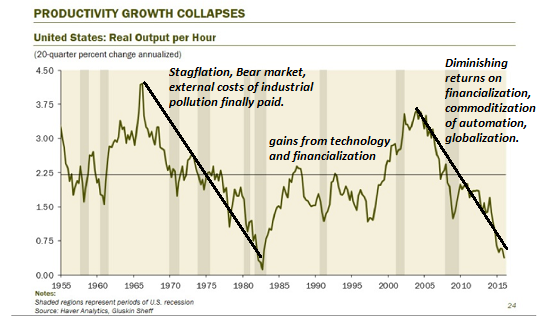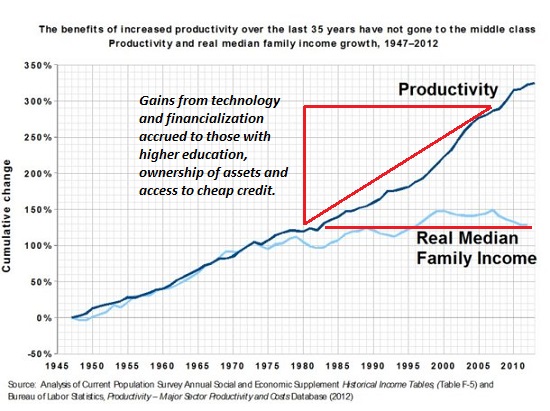We need a new economic model that recognizes the value of useful work that isn’t necessarily profitable.
All the media chatter about work disappearing due to automation fails to draw the critical distinction between useful but unpaid work and profitable work.Since value (and profits/wages) flow to what’s scarce, what matters is not the decline of useful work–there’s plenty of that even in a society that has automated production–but the supply of paid work–work that is profitable and hence worthy of wages.
Mark Jeftovik and I discuss work, profit and new models of paying for useful work(44:47) in a free-ranging podcast on my book A Radically Beneficial World.
The great fantasy that many are depending on to solve the decline of paid work is taxing the robots and software that ate all the jobs. These taxes are supposed to pay for the Universal Basic Income that everyone will enjoy once work is automated and jobs become scarce.
Commoditization and globalization push profits down to near-zero. In a world of ever-cheaper, ever more abundant commoditized tools and software, it becomes much more difficult to generate increases in productivity and profits.
Those who dream of the the end of work forget that robots will only be purchased to perform profitable tasks. Much of human life is not profitable. For example, maintaining dedicated bikeways is useful work that serves the health and transportation needs of the community and economy.
There is no way to make this work profitable unless you charge bicyclists for using the bikeways, which defeats the purpose of the bikeways.
The typical response is that governments will pay for robots to maintain bikeways. But that leads right back to the decline of profits and paid labor: since government depends on profits and paid work for its revenues, as those decline, where will government get the revenue to make good all its vast promises for pensions, services, healthcare etc., and buy and maintain robots to do unprofitable but useful work such as maintain bikeways?
Take a look at these charts of productivity and income. Ultimately, increases in jobs, wages and profits flow from increases in productivity, which typically rises as a result of investments in better tools, training and processes.
Productivity struggles when investment stagnates, external costs (such as paying to remediate industrial pollution) reduce the available pool of capital/profits to invest, and new technologies are either limited in scope or do not scale well.
All these factors played a role in the 15-year stagnation of productivity from 1966 to 1980.
As computer/digital technologies improved and dropped in price (i.e. scaled up to impact the entire economy) and financialization (i.e. abundant credit and leverage, and the commoditization of financial assets) provided new sources of profits, productivity increased from 1981 to 2005.
Since then, growth of productivity has been in a freefall: financialization has reached diminishing returns, the technologies of automation have been commoditized, and globalization has opened up a vast new labor force and new places to invest capital.
In sum: what was once scarce is now abundant, and thus it no longer generates value or profits.

When new productivity tools were scarce (unique to American factories and workplaces) and required a growing labor force, productivity growth translated into higher wages. But when productivity growth relied on financial capital and processes and higher-level technical/managerial skills, the gains flowed only to those who owned these processes and skills: generally speaking, the wealthy owners of productive capital and the highly educated technocrat/managerial class (the top 5% and to a lesser degree, the top 20%.)

All of which is to say the model of paying wages for profitable work (or collecting taxes from profits and profitable work to pay government workers) is broken: not slightly broken, but fundamentally broken.
We need a new economic model that recognizes the value of useful work that isn’t necessarily profitable, an economic system that creates money to pay those doing useful work at the bottom of the pyramid rather that creating money only for banks, corporations and financiers at the very top of the pyramid.
There is plenty of work that is useful but not profitable. Work won’t disappear; it’s paid work and profits that will become increasingly scarce. We need a new system that enables an abundance of paid work. This is the topic of my book,which Mark Jeftovik and I Discuss in this podcast (44:47).
No comments:
Post a Comment